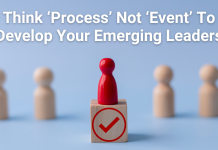
Can one powerful question close a sale, engage a team member, or even strengthen your marriage?
To create a real and lasting connection, whether it’s in business or our personal lives, the key has always been in finding trust and common ground. By asking questions that allow people to open up and speak truthfully, we can start a frank discussion that leaves room for exploration and understanding. So what questions can start these powerful conversations? And when should we use them?
Andrew Sobel has written eight best selling books on how to develop enduring professional relationships. His most recent work is Power Questions: Build Relationships, Win New Business, and Influence Others. I recently interviewed Andrew for the LEADx podcast to delve into what questions can create a meaningful back-and-forth, and to start a power conversation of our own. (The interview below has been lightly edited for space and clarity.)
Kevin Kruse: How did you discover the power of questions?
Andrew Sobel: You know, I was one of these people that overvalued expertise and the rational side of things, I think like a lot of people in business. It basically came to me when I wrote my very first book, Clients For Life. For that book, I interviewed a large number of CEOs and C-Suite executives about their most trusted advisors. One of the common refrains was, “The person who was my trusted advisor was a great listener. He asked great questions.” That led me to a paradigm shift, which I called ‘The Expert vs. The Advisor’ mindset. Experts like to tell advisors, “Ask great questions and listen.” Now, obviously advisors also do advising. You have expertise, but it's a shift from: “I'm here to tell you about how smart I am and how much I know about this area” to “I'm here to build a relationship with you, learn about your toughest issues and then add value to those issues using my expertise.”
Kruse: That's a big difference.
Sobel: Yeah, so that's what I learned writing my first book, but to be honest it took me a number of years to really develop the concept and realize how powerful questions are. In fact, since I wrote the book with Jerry Panas about four or five years ago, I've used the material a lot and I've discovered a lot more things. But power questions–they are a little different than ordinary questions.
Kruse: Tell us more about that.
Sobel: Sure. So power questions shift the conversation to the other person, to their interest, their needs, their thoughts. It might simply be, “So Kevin, what do you think?” or “Kevin, what options are you considering?” The other thing I like about power questions is that they often get you focused on the right issue, and in particular, on the issue that the other person wants to discuss. Whether that's a client, your boss, or a colleague. Sometimes I'll start a meeting saying, “What's the most important thing we should be talking about this morning?” or “From your perspective, what's the most valuable way to use this time?”
Sometimes a potential client calls me up and there's no real clear agenda. They just want to talk to me, learn a bit about what I do, and I'll say, “Look, we've got half an hour. From your perspective, what's the most valuable way to use this time?” This focuses it on the other person and then their energy level. Their enthusiasm is tripled, because they're talking about what they want to focus on, not what you're trying to focus on. Sometimes a power question is a ‘Why’ question. In other words, you're trying to get to the root cause of something, to the higher-level objective. “Why are you launching this program now? Why did you choose this particular option?” There's a great quote from Mark Twain that gets at this and he said, “The two most important days in your life are the day you were born and the day you find out why.”
Then finally, and I think you mentioned to me that you've used this question, power questions enable you to connect on a very personal level and just learn about the other person. What I love is just, “How did you get your start? You've been in this business for 25 years, how'd you get your start?” That's an invitation for someone to tell their story, and we love telling our stories.
Kruse: I know you also make a distinction about rational versus emotional questions. So how are those different?
Sobel: Sure. Most of us ask what I call ‘rational questions.’ That might be as simple as, “So, Kevin, what are your top three priorities for this year in developing and growing your business?” Let me highlight the difference with a very quick story. I was at a presentation by a CEO to his top 100 leaders a few years ago. It was a yearend conference and I had given a talk that morning, and they asked me to sit in on Tim's (the CEO) speech. Tim gave this 30-minute presentation, went through some slides, and then said to the group, “Any questions?” People began raising their hand and saying, “Tim, could you go back to slide 17 and talk about the reserves that we made?” “Tim, could you go back to slide 18, and talk about why we decided to go to a shared services model? Some people are still concerned about this.”
Just picayune questions about details, and at the end, I raised my hand and Tim, who I didn't know very well, said, “Andrew, do you have a question?” I said, “Sure. Tim, I'm curious, of all the initiatives you have going on in the corporation right now, what are you personally most excited about?” He just stopped dead. He smiled, stood up tall, and waxed on for five minutes about a very special initiative that he was personally very passionate about and involved with, that he had not even mentioned when he went through the slides.
Afterwards, he came up to me in the crowd as we were all leaving, and he slapped me on the back, and I looked, and there's this big tall guy. He's much taller than me, about 6’7”, and he said, “Thank you for that question–very revealing question.” Then, as he walked off, he turned around again and pointed his hand at me and said, “Give me a ring.” That actually became my ticket to building a relationship with him.
Kruse: What questions can our listeners use to coach or mentor their own team members?
Sobel: There are different roles you play as a mentor or a coach, of course, and I think the first thing you need to do is establish trust with the person. In fact, we've been for a program I'm developing for young professionals. We've been interviewing a lot of millennials on this subject, and one of the topics that comes up a lot is, “Well, the first thing a mentor has to do is establish trust with me. I need to trust them.” Of course, you establish trust first by connecting, by demonstrating that you have their best interests in mind, that you're there for them, that you're not working any agenda yourself. Often I start with the question, “How can I be of greatest help to you in our relationship? How can I be helpful to you right now?”
Another version is, “What questions are you grappling with now that I can help you with?” I also like to get to know the person personally and that goes back to some of our other questions about, “When you're not shaking things up here in the office, what do you do on your weekends? Tell me about your last vacation. What are you doing outside of work that you're excited about?” Maybe they play guitar, maybe they're a runner, who knows? There's another question that we write about in power questions actually, which Steve Jobs used to use with his engineers all the time, which is, “Is this the best you can do?”
There's a lot of stories behind this. Henry Kissinger also used this with his staff, “Is this the best you can do?” Obviously, you need to be careful because you can drive someone to madness, pushing them and pushing them, but if somebody hands you a report or an analysis, you might say, “Is this the best you and your team can do right now?” They might say, “It's absolutely the best” or they might say, “Look, let us work on it a little more.” This is a question, again, you've got to be careful with it, but it is a question that some pretty famous, brilliant, demanding bosses used to get the absolute best out of the people who worked for them.
Kruse: I love that question and it also opens up potentially to follow-ups and could lead to some interesting conversations in itself.
Sobel: Yeah, absolutely. Then, “How can I help you?” Is always something I try to drive towards, and I learned this from my old boss, Jim Kelly at Gemini Consulting, he was the founder of the company that we sold to them. And as CEO, everybody would go to him with problems, with complaints, with big situations. He would always listen very carefully. And often, his response was a question. He had two questions: “Is there something that I can do right now to help you?” Another one was simply, “Is there a decision that you need from me?”
Those two questions actually pretty much handled most of his conversations.
Kruse: I think those could be staples in all the managers' weekly one-on-ones. Then at least once a week you're doing that check-in.
Sobel: One or two others I like to ask people that I'm mentoring or coaching, one of them is just, “What's getting in the way of your work?” In large organizations–Kevin, of course you know this better than anyone else–often there's lots of stuff getting in the way. Whether it's bureaucracy or it's somebody that's not sharing information, or whatever, but “Is there anything getting in the way of this project? Anything getting in the way of your work?” I think that's a nice question to draw people out. Another question I ask, sometimes to an executive is, “I'm curious, what parts of your work do you wish you could spend more time on, and which parts do you wish you could spend less time on?”
You get a really interesting discussion that evolves from that, because you start to find out how could that person actually be even more effective, what are the strategic parts of their job that they really do need to spend more time on? What are the less ‘value added’ things that are dragging them down? So that's a question you could ask a very senior executive and have a very interesting conversation. You could also ask someone who's starting out in their job.
Kruse: I always like to challenge our listeners to get just a little bit better every single day. Do you have something we could try out today?
Sobel: Sure. Very simple prescription: prepare three good, thoughtful questions for every meeting you go to. Whether it's an internal meeting about a project that you're working on, a meeting with your boss about something, a meeting with a client or a customer. Just spend more time preparing three questions and less time working on those PowerPoint slides.
Seriously, less time worrying about whether you can fit another sentence onto the slide. You only need three questions, and if they're good, you're probably not even going to get to number three. You might only get to number one and two, because then you'll have follow-up questions and you'll have a great conversation.
—
Kevin Kruse is a New York Times bestselling author, host of the popular LEADx Leadership Podcast, and the CEO/Founder of LEADx.org, which provides free world-class leadership training, professional development and career advice for anyone, anywhere.





